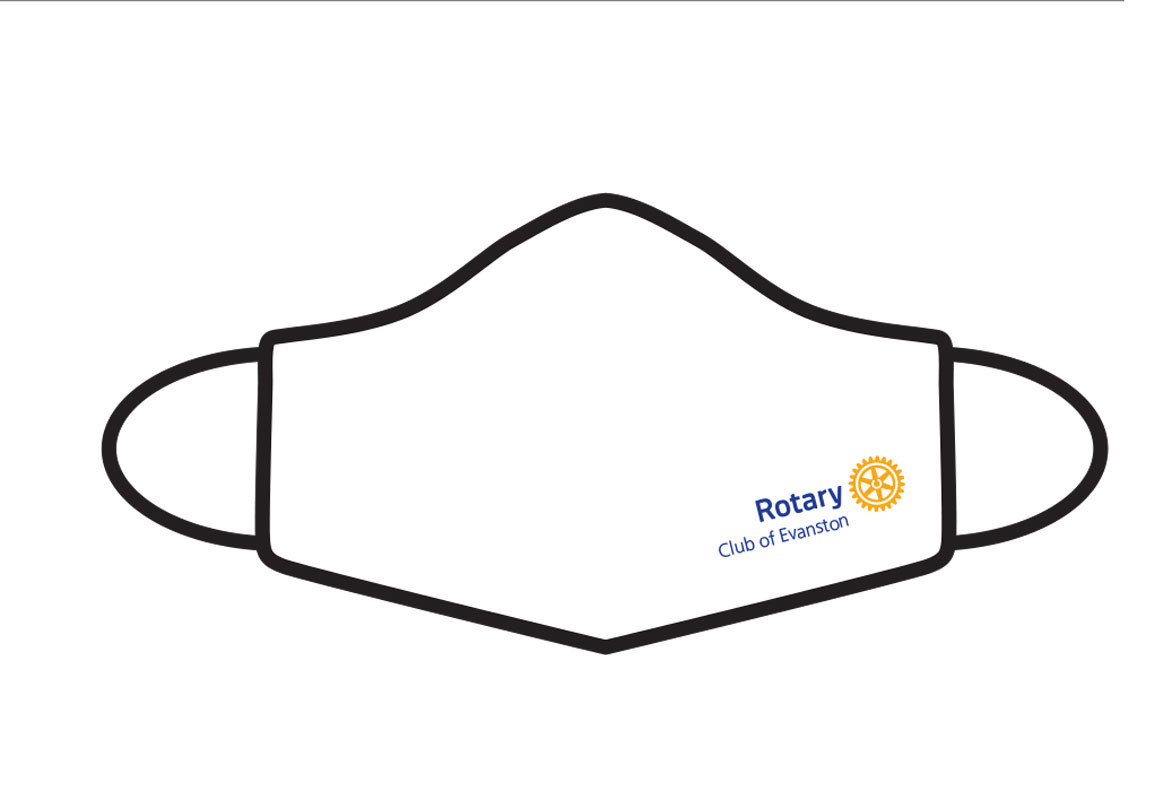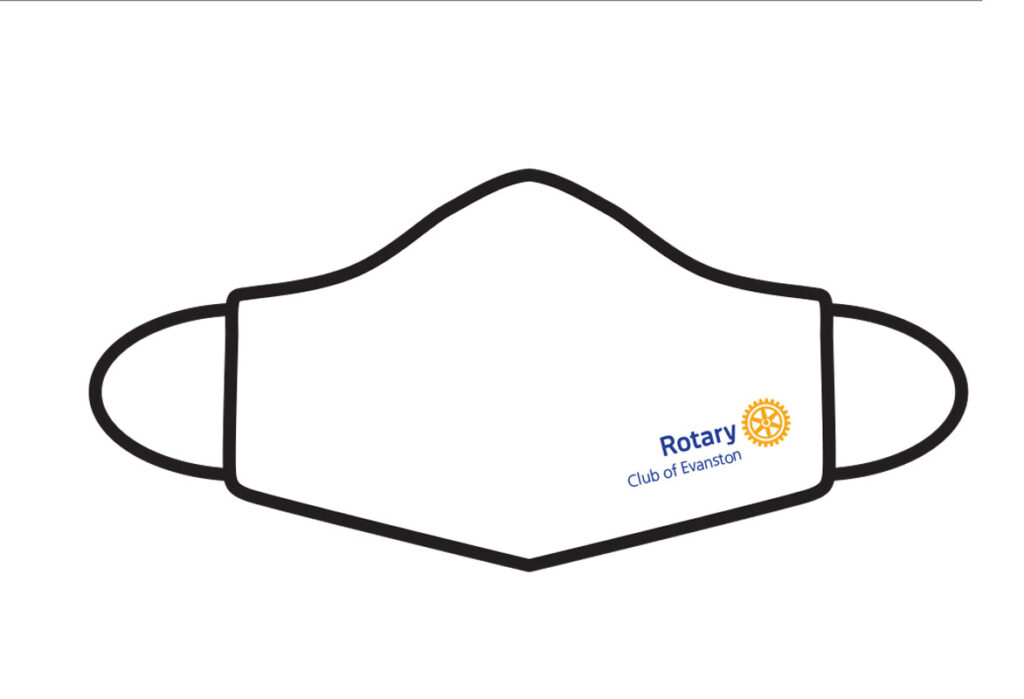These guidelines are for clubs and their members who are interested in buying, designing, donating, or selling face masks, including Rotary-branded face masks, and buying, producing, donating, and selling hand sanitiser.

During this global pandemic, we need to be sensitive while meeting the needs of the community. Distributing face masks or hand sanitiser to the public that feature large or conspicuous Rotary logos may be seen as capitalising on this health crisis to raise money or promote membership. For that reason, we’d like any face masks or hand sanitiser distributed or sold to the public by clubs to have a discreet design. If the design includes the Masterbrand Signature, Mark of Excellence, or another Rotary logo, the logo must be small and unobtrusive. Face masks designed specifically for club members’ personal use may have a larger and more prominent Rotary logo.
There has been a renewed focus on proper hand washing and sanitising practices in response to the Covid-19 pandemic. We know that many clubs have been donating and providing hand sanitiser as part of their community response. We encourage clubs to continue to share information from Rotary’s water, sanitation, and hygiene initiatives to help keep people safe.
Rotary Face Masks
Buying or designing face masks Licensed vendors have begun to sell approved Rotary-branded face masks. Some licensees can also help clubs create their own designs. See a current list of licensed vendors worldwide.
If you want to produce your own face mask design or have a face mask design manufactured or produced by an unlicensed vendor, submit a release request along with a sample design of the face mask.
When creating a custom design, include your club or programme logo. (This is required if these face masks will be sold to the public and for certain donations, see below.) Visit brandcenter.rotary.org to create your club logo. If you decide to include your club or programme logo, remember that it must be small and unobtrusive. Your custom design will be reviewed and, if approved, Rotary will grant authorisation for production.
Questions about buying or designing a Rotary-branded face mask can be sent to rilicensingservices@
rotary.org.
Donating face masks to the community If you are donating face masks to the public, consider using Rotary branding on the packaging instead of on the face mask itself. If the face mask is Rotary-branded, it should have a discreet design. If the design includes a Rotary logo, the logo must be small and unobtrusive.
You can obtain face masks from a licensed vendor or obtain permission to create custom-
designed face masks through a release request. If your club wants to donate Rotary-branded face masks to the public, donated face masks must include a club logo or programme logo unless you are donating stock masks purchased from a licensed vendor.
Selling face masks to the community If your club wants to sell Rotary-branded face masks to the public, it may do so on a limited basis through June, 30 2021. The face masks must be custom-designed to include your club logo or programme logo. We would suggest your club give away the face masks in exchange for a donation to show #RotaryCares. Clubs do not need a license to sell face masks, as long as they use their club logo or programme logo and the design has also been approved by RI through a release request.
All face masks offered for sale should include a disclaimer on the promotional materials such as: “Cloth face coverings are intended for personal use only. They are not intended for medical use and are not a replacement for medical-grade personal protective equipment.”
Rotary Hand Sanitiser
Buying or producing hand sanitiser You may purchase hand sanitiser from licensed vendors. See a current list of licensed vendors worldwide. If you want to produce your own hand sanitiser or engage an unlicensed vendor to produce hand sanitiser with your club or programme logo, you must abide by all applicable local, national, and international regulations and guidance, including labelling guidance and guidance or regulations adopted on a temporary basis during the Covid-19 pandemic. You must submit a release request along with a sample design. Non-branded hand sanitiser is not subject to Rotary International review.
Questions about buying or producing hand sanitiser can be sent to rilicensingservices@rotary.org.
Donating and selling hand sanitiser to the community If you want to donate or sell hand sanitiser with Rotary branding, you must include a discreet club or programme logo, unless your donations were purchased from a licensed vendor.
While we don’t encourage selling hand sanitiser, if your club chooses to do so, we would suggest your club provide it in exchange for a donation. Clubs do not need a license to sell hand sanitiser, and may sell on a limited basis through June, 30 2021, as long as they use their club logo or programme logo and the design has also been approved by RI through a release request.
All hand sanitiser, alcohol-based or non-alcohol-based, offered for sale or donation must comply with all applicable local, national, and international regulations and guidance, including labelling guidance. Don’t use statements like “effective at eliminating over 99.9 per cent of germs and bacteria” or “kills flu or coronavirus” in conjunction with your distribution or sale.
© rotary.org.
Insurance and Risk Mitigation
The US Rotary Club and District general liability policy is not intended to address the unique needs of clubs or districts that are selling, manufacturing, designing, or distributing face masks or hand sanitiser. This may also apply to club insurance policies outside the United States. Any club or district that is engaged in the manufacturing or distribution of hand sanitiser or face masks should obtain separate product liability insurance to protect its interests. Additionally, all clubs and districts should:
- Review contracts with vendors to ensure they do not assume risks or responsibilities beyond their control. For example, the seller of a product should not agree to assume responsibility for claims arising out of the manufacturing or design of a product.
- The indemnity provision in a vendor contract should spread the risk of loss to the parties who are actually responsible for that loss. Contracts with vendors should also include a provision requiring that all parties maintain adequate insurance.
- We recommend you consult an attorney to draft or review any vendor contracts.







